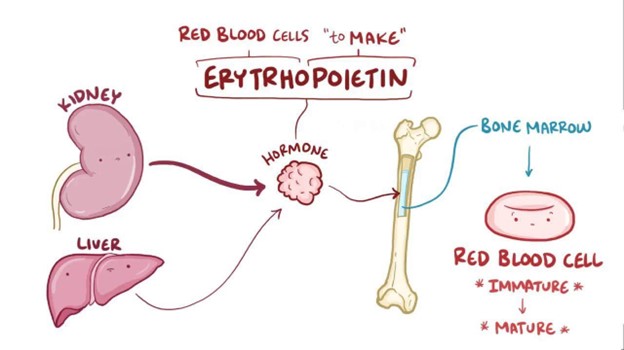A client with chronic renal failure asks the nurse the effects of losing erythropoietin. Which of the following statements best explains the loss of this hormone?
Loss of erythropoietin will result in diminished immunologic function.
Loss of erythropoietin will result in hypertension.
Loss of erythropoietin will result in elevated lipid levels in the bloodstream.
Loss of erythropoietin will result in anemia.
The Correct Answer is D
Choice A Reason: Loss of erythropoietin will not result in diminished immunologic function, but it may affect the production of some white blood cells and antibodies.
Choice B Reason: Loss of erythropoietin will not result in hypertension, but it may cause hypotension due to reduced blood volume and viscosity.
Choice C Reason: Loss of erythropoietin will not result in elevated lipid levels in the bloodstream, but it may be associated with dyslipidemia due to other factors such as malnutrition, inflammation, or medication use.
Choice D Reason: Loss of erythropoietin will result in anemia, as erythropoietin is a hormone that stimulates the bone marrow to produce red blood cells.

Nursing Test Bank
Naxlex Comprehensive Predictor Exams
Related Questions
Correct Answer is D
Explanation
Choice A Reason: N0 does not indicate presence of regional lymph node involvement, but absence of it. N1 to N3 indicate increasing degrees of regional lymph node involvement.
Choice B Reason: TIS does not indicate that a tumor has been resolved, but that it is in situ, meaning that it is confined to the original site and has not invaded deeper tissues.
Choice C Reason: T4 does not indicate a tumor at its smallest size, but at its largest size. T1 to T4 indicate increasing sizes or extents of the primary tumor.
Choice D Reason: M1 indicates tumor metastasis to a single site, meaning that the cancer has spread to another organ or distant lymph node. M0 indicates no distant metastasis.
Correct Answer is C
Explanation
Choice A Reason: Fatigue is not the priority finding for a client who has a low platelet count, as it may indicate other conditions such as anemia, infection, or depression.
Choice B Reason: Anorexia is not the priority finding for a client who has a low platelet count, as it may indicate other conditions such as nausea, pain, or anxiety.
Choice C Reason: Bleeding is the priority finding for a client who has a low platelet count, as it indicates that the client is at risk of hemorrhage and shock due to impaired blood clotting.
Choice D Reason: Fever is not the priority finding for a client who has a low platelet count, but it may indicate an infection that requires prompt treatment.
Whether you are a student looking to ace your exams or a practicing nurse seeking to enhance your expertise , our nursing education contents will empower you with the confidence and competence to make a difference in the lives of patients and become a respected leader in the healthcare field.
Visit Naxlex, invest in your future and unlock endless possibilities with our unparalleled nursing education contents today
Report Wrong Answer on the Current Question
Do you disagree with the answer? If yes, what is your expected answer? Explain.
Kindly be descriptive with the issue you are facing.
